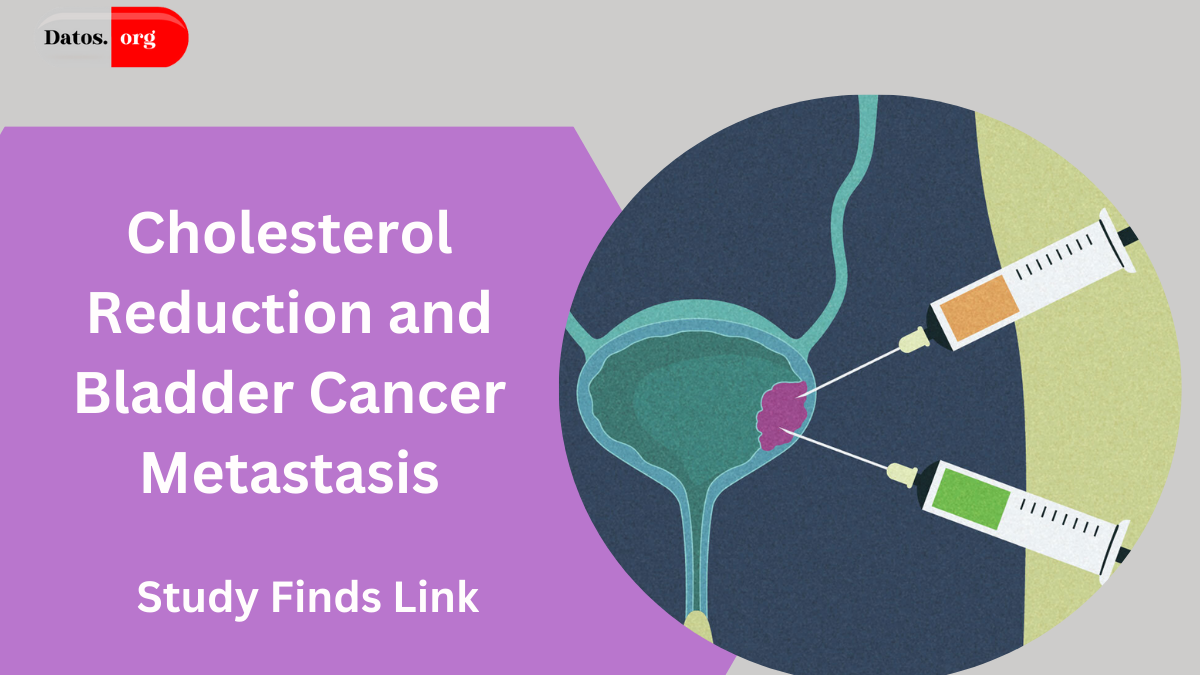Bladder cancer, a common form of cancer affecting the urinary system, is often diagnosed at later stages when it may have spread to other parts of the body.
However, recent research suggests that controlling cholesterol levels could play a significant role in slowing or even preventing the spread of bladder cancer.
In this article, we explore the findings of the latest study on cholesterol and bladder cancer, how cholesterol impacts cancer cells, and steps you can take to reduce your cholesterol levels.

- Understanding Cholesterol’s Role in Bladder Cancer
- Key Findings from the Study
- Impact of Cholesterol on Cancer Cells:
- How Reducing Cholesterol May Help
- Ways to Reduce Cholesterol and Help Control Cancer Spread
- Conclusion
- People May Ask
- What are statins, and how can they help with bladder cancer?
- What dietary changes can help lower cholesterol levels?
- Is regular exercise beneficial for lowering cholesterol?
- How does high cholesterol contribute to cancer growth?
Understanding Cholesterol’s Role in Bladder Cancer
Cholesterol is a type of fat that is essential for building cell membranes and producing certain hormones.
However, elevated cholesterol levels can contribute to various health problems, including cardiovascular diseases, and it may play a role in the development and progression of cancer.
Recent studies have indicated that high cholesterol levels are linked to an increased risk of cancer cell proliferation, including the spread (metastasis) of bladder cancer.
The mechanism behind this connection is still under investigation, but it is thought that high cholesterol may promote the growth of blood vessels that nourish tumors, aiding in their expansion.
ALSO READ: Chronic Inflammation and Psoriasis: Key Steps to Reduce Symptoms in 2025
Key Findings from the Study
The study, published in a prominent medical journal, highlights the potential connection between cholesterol levels and the spread of bladder cancer.
Researchers found that individuals with higher cholesterol levels had a higher risk of bladder cancer metastasis compared to those with normal cholesterol levels. This suggests that reducing cholesterol could slow the disease’s progression and improve patient outcomes.
Impact of Cholesterol on Cancer Cells:
- Tumor Growth: High cholesterol may facilitate the growth of tumors by providing more resources for the cells.
- Blood Vessel Formation: Cholesterol can aid in the creation of new blood vessels (angiogenesis) that tumors need to grow and spread.
- Increased Inflammation: Elevated cholesterol levels contribute to inflammation in the body, which is often associated with cancer progression.
How Reducing Cholesterol May Help
Reducing cholesterol levels could potentially slow the spread of bladder cancer. Statins, medications typically used to lower cholesterol, have shown promise not just for heart health but also as potential agents for cancer treatment.
By lowering cholesterol, these drugs might help prevent the blood supply to tumors, impair tumor growth, and reduce the risk of metastasis.
Ways to Reduce Cholesterol and Help Control Cancer Spread
- Adopt a Heart-Healthy Diet
A heart-healthy diet rich in fruits, vegetables, whole grains, and lean proteins can significantly help in lowering cholesterol levels. Reducing saturated fats and trans fats is particularly important.- Increase Fiber Intake: Foods high in fiber, such as oats, legumes, and vegetables, can help reduce cholesterol.
- Healthy Fats: Replace unhealthy fats with healthy fats like those found in olive oil, avocado, and nuts.
- Exercise Regularly
Physical activity not only helps manage weight but also helps in lowering bad cholesterol (LDL) while boosting good cholesterol (HDL). Regular exercise can have a profound impact on both heart and cancer health.- Aim for at least 30 minutes of moderate exercise most days of the week.
- Combine aerobic exercise (such as walking, cycling, or swimming) with strength training for better results.
- Medications for Cholesterol
Statins are commonly prescribed to lower cholesterol, and some studies suggest that they may have a protective effect against cancer metastasis. These medications can reduce the levels of LDL (low-density lipoprotein), the “bad” cholesterol that contributes to plaque build-up in arteries. - Quit Smoking and Limit Alcohol
Both smoking and excessive alcohol consumption contribute to high cholesterol levels and increase the risk of cancer progression. By quitting smoking and limiting alcohol intake, individuals can significantly improve their overall health and reduce cancer-related risks.
Conclusion
The link between high cholesterol and the spread of bladder cancer is still being explored, but recent findings indicate that controlling cholesterol may help reduce the progression and spread of this type of cancer. By adopting lifestyle changes such as improving diet, increasing physical activity, and managing cholesterol levels with medication, individuals can not only improve their cardiovascular health but also potentially slow the growth of bladder cancer. As research continues, these findings could lead to more effective treatments and better outcomes for those affected by bladder cancer.
People May Ask
What are statins, and how can they help with bladder cancer?
Statins are medications that lower cholesterol levels. They may also have anti-cancer properties by limiting tumor growth and reducing the blood supply tumors need to spread.
What dietary changes can help lower cholesterol levels?
Eating a diet high in fiber, healthy fats, and lean proteins while reducing saturated fats and trans fats can help lower cholesterol levels effectively.
Is regular exercise beneficial for lowering cholesterol?
Yes, regular physical activity can help raise HDL (good cholesterol) and lower LDL (bad cholesterol), improving overall cholesterol levels and promoting heart health.
How does high cholesterol contribute to cancer growth?
High cholesterol can contribute to cancer growth by aiding tumor growth, encouraging blood vessel formation (angiogenesis), and increasing inflammation in the body, all of which support the spread of cancer cells.
Click here to learn more.